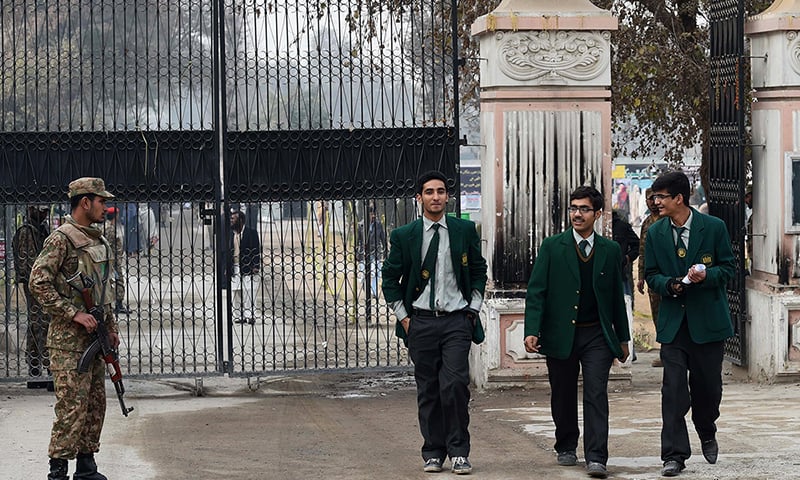"Is today the day I shall send my kids to school and regret for the rest of my life?" is the dilemma that parents in Pakistan wake up to each morning now.
The looming shadow of terrorism that hovers over our kids is consuming us, parents, to the point of a nervous breakdown. We are raising our kids in an environment where even the basic right, the harmless act of sending kids to school has become a subject of national debate.
As the extended winter vacations came to an end, parents looked up to the national security policy to ensure their children's safety at schools. The security measures are promising, no doubt, and schools have been vigilantly following the government's instructions in providing security to students.
But, at the same time, terrified citizens also fear repercussions and revenge killings by terrorists in the aftermath of the military's crackdown on terrorism. Such fears are further solidified by threatening video releases, rumours of coffins thrown inside prominent educational institutions and alleged threatening letters received by various school administrators. One may question the validity of such fears, but low attendance rate in schools depict we are losing the psychological warfare.
We have largely been a resilient nation, with an amazing capacity to laugh at life's absurdities and withstand oddities.
We have stood tall with indefatigable smiles in times of political turmoils, economic recessions, natural disasters and social unrest.
Yet, unfortunately, the recent Peshawar tragedy and the perpetual fear of losing our little ones is taking its toll on us.
Pakistan today suffers a deficit of hope.
Media coverage of the latest national tragedy is pathetic and hopeless. On the one hand, it reinforces the horrors of December 16, and on the other, it confuses the nation about the identity of our real enemy.
The coverage of known Taliban apologists who refused to condemn the attacks was simply uncalled for. Sadly, most opinion leaders in Pakistan – usually people of religious credentials and political omniscience – shied away from declaring Taliban as the real enemy.
They instead deliberately misled masses into believing in the wrong enemy, particularly India. With the kind of melodramatic, pessimistic and stagnant media coverage over the APS attacks, one might say that the media still needs to go a long way in order to reclaim professionalism. It is failing to provide masses their much sought after antidotes, hope and reassurance.
The army chief's appearance at the APS was reassuring. Similarly, gestures from the boxer Amir Khan and from our cricket team were much needed. International celebrities, particularly Indians, wrote pieces too, and they made occasional highlights on our media.
Sadly, the absence of our own celebrities at this occasion has been pathetically obvious. It sends the impression that they are either too oblivious or too afraid to speak up.
In every society, there are a few who are looked upon as role models. Their words leave impressions on ordinary minds, their resolve taken up by masses. Pakistani students and parents want to hear words of reassurance from the nation's opinion leaders – those who can stand out and reassure or lead by example that they are not afraid in sending their own kids to school.
Such testimonials by celebrity parents, teachers and students of the APS who have resumed schooling after the attacks is strongly required to uplift the considerably low national morale. The national tragedy has broken us down, but the same can be instrumental in building up our fractured nationalism.
The terrorists have attacked our national psyche. Let us reassert our normalcy and reclaim our lives from terrorism. We have done it earlier, we will do it again.
All we need is a little wind to sail our boats.


No comments:
Post a Comment